Constitutional Court Unanimously Removes Yoon Suk-yeol from Presidency: “Unacceptable Grave Violation Betraying Public Trust”
▶ All Five Impeachment Grounds Upheld… ‘Arrest of Politicians and Dragging Out Lawmakers’ Acknowledged as Facts
▶ Yoon’s Procedural Objections Rejected… “No Issue with Withdrawing Insurrection Charge, Impeachment Motion is Valid”

Acting Chief Justice Moon Hyung-bae announced the impeachment ruling at approximately 11:22 AM, stating, “Yoon Suk-yeol is removed from the presidency.” With this pronouncement, the removal took immediate effect, and Yoon lost his position as president.
The court stated, “The respondent (President Yoon) mobilized military and police forces to undermine constitutional institutions such as the National Assembly and violated the fundamental rights of the people, thereby betraying the duty to uphold the Constitution.” It added, “This constitutes a grave violation of the law that cannot be tolerated from the perspective of constitutional protection, as it betrayed the trust of the people.”
The court further emphasized, “By declaring martial law in violation of the Constitution and laws, the respondent revived the history of abusing national emergency powers, shocking the nation and causing chaos across social, economic, political, and diplomatic spheres.” It concluded, “The benefit of upholding the Constitution through the respondent’s removal overwhelmingly outweighs the national losses incurred by such an action.”
The Constitutional Court upheld all five grounds for impeachment raised by the National Assembly, determining that Yoon’s actions constituted serious constitutional and legal violations warranting removal from office.
This ruling comes 122 days after Yoon declared emergency martial law on December 3 of the previous year and 111 days after the impeachment motion was filed with the court on December 14.
At 11:00 AM, the Constitutional Court held the impeachment ruling session in its main courtroom and unanimously upheld the National Assembly’s impeachment motion, with all justices in agreement.
No justices issued dissenting opinions, though some provided supplementary opinions to elaborate on specific issues while agreeing with the conclusion.
The court found that there was no national emergency on December 3 of the previous year, yet Yoon illegally declared martial law in violation of constitutional requirements.
Regarding the so-called “line-item impeachment” and budget cuts, the court noted, “Even if the National Assembly’s exercise of authority was unlawful or unjust, it could have been addressed through ordinary means of power, such as the Constitutional Court’s impeachment trial or the respondent’s veto request, and thus does not justify the exercise of national emergency powers.”
On Yoon’s claim that the martial law was intended as a “warning” or “appeal,” the court stated, “There is no such thing as a warning or appeal-based martial law. The essence of emergency martial law is to overcome a grave crisis through military force, so its declaration cannot merely serve as a warning.”
The court also dismissed the “election fraud” claims cited as a pretext for martial law, stating, “Such allegations alone do not indicate that a grave crisis had realistically occurred, and they cannot justify the declaration of martial law.”
The court further determined that Yoon violated procedural requirements, as no substantive deliberation took place during the cabinet meeting prior to the martial law declaration, and the National Assembly was not notified as mandated.
Regarding Proclamation No. 1 issued by the martial law command, the court ruled that it “violated constitutional provisions granting the National Assembly the right to demand the lifting of martial law, as well as provisions on the party system, representative democracy, and the separation of powers, by prohibiting the activities of the National Assembly, local councils, and political parties.”
The allegation that Yoon attempted to obstruct the National Assembly’s resolution to lift martial law by ordering the removal of lawmakers gathered at the National Assembly was also acknowledged as fact. The court stated, “The respondent instructed the commander of the Army Special Warfare Command and others to ‘break down the door and drag out those inside, as it seems the quorum for a vote has not been met.’”
The court also confirmed as fact that attempts were made to track the locations of key politicians and legal figures during the martial law declaration.
It noted, “The Minister of Defense instructed the commander of the Military Counterintelligence Command to identify the locations of 14 individuals, including the Speaker of the National Assembly and party leaders, for potential arrests if necessary. The respondent called the First Deputy Director of the National Intelligence Service to support the Military Counterintelligence Command, and the commander requested the NIS deputy director to track the locations of these individuals.”
Additionally, “The targets included a recently retired Chief Justice of the Supreme Court and former Supreme Court justices, which pressured active judges by implying they could be subject to arrest by the executive branch at any time, thereby infringing on judicial independence.”
While the direct orders were attributed to former Defense Minister Kim Yong-hyun, the court specified in its ruling, “The respondent was involved in instructions to track the locations of key politicians for potential arrests to restrict their activities,” adding, “It is difficult to conclude that Kim Yong-hyun’s orders were made independently of the respondent’s intent.”
The testimonies of Hong Jang-won, former First Deputy Director of the National Intelligence Service, and Kwak Jong-geun, former commander of the Army Special Warfare Command, which Yoon’s side heavily challenged for credibility during the impeachment trial, appear to have been accepted as factual.
The allegation that Yoon violated the Constitution by ordering an unjust search and seizure of the National Election Commission was also upheld. Yoon had claimed it was a lawful martial law operation and necessary to inspect the election system, but the court found that the commission was functioning normally at the time, making the martial law command’s actions unjustifiable.
Regarding these constitutional and legal violations, the court concluded, “The respondent betrayed the duty to uphold the Constitution and gravely violated the trust of the South Korean people, the sovereigns of this democratic republic, causing incalculable harm to democracy.”
The court rejected all procedural objections raised by Yoon’s side.
On the so-called “insurrection charge withdrawal” controversy, the court ruled that it did not constitute a change in the grounds for impeachment and that the president’s martial law declaration is subject to judicial review.
The court also dismissed Yoon’s claims that the impeachment motion was invalid due to bypassing the National Assembly’s Judiciary Committee investigation or violating the principle of double jeopardy.
Justices Kim Bok-hyung and Cho Han-chang provided supplementary opinions suggesting that stricter application of the hearsay rule (requiring firsthand testimony to be submitted directly in court) is needed in future impeachment trials, while Justices Lee Mi-seon and Kim Hyung-doo suggested that the hearsay rule could be relaxed.
Justice Jung Hyung-sik offered a supplementary opinion calling for legislation to limit the number of impeachment motions with the same content, even across different parliamentary sessions.
The Constitutional Court received the presidential impeachment case on December 14 of the previous year and held 11 hearings until February 25. After over a month of deliberations, it delivered the ruling on this day.
Yoon’s impeachment trial set a record for the longest deliberation period among presidential cases, both in terms of the overall trial duration and the deliberation period after the hearings concluded.
At around 1:50 PM, Yoon, through his legal team, issued a brief statement: “I am deeply sorry and regretful for not meeting the expectations of the people.”
Yoon’s attorney, Yoon Gap-geun, told reporters after the ruling, “This is a decision that is legally unacceptable,” expressing “regret and dismay.”
National Assembly Judiciary Committee Chairman Chung Chung-rae, a member of the Democratic Party and part of the impeachment prosecution team, stated, “I deeply thank the Constitutional Court for its wise and historic ruling in defeating the enemy of the Constitution with the Constitution.”
The phoenix flag, a symbol of South Korea’s head of state, which had been raised at the main gate of the Yongsan Presidential Office, was lowered from its pole at approximately 11:40 AM that day.
[Yonhap News]
스마터리빙
more [ 건강]
[ 건강]이제 혈관 건강도 챙기자!
[현대해운]우리 눈에 보이지 않기 때문에 혈관 건강을 챙기는 것은 결코 쉽지 않은데요. 여러분은 혈관 건강을 유지하기 위해 어떤 노력을 하시나요?
 [ 건강]
[ 건강]내 몸이 건강해지는 과일궁합
 [ 라이프]
[ 라이프]벌레야 물럿거라! 천연 해충제 만들기
 [ 건강]
[ 건강]혈압 낮추는데 좋은 식품
[현대해운]혈관 건강은 주로 노화가 진행되면서 지켜야 할 문제라고 인식되어 왔습니다. 최근 생활 패턴과 식생활의 변화로 혈관의 노화 진행이 빨라지고
로컬뉴스
more
한미사랑의재단 연말모임
한미사랑의재단(총재 이호제)이 지난 22일 뉴저지 마당 식당에서 연말 모임을 열었다. 이날 참석자들은 식사를 함께 하고 노래를 같이 부르며 한…

한국전참전용사총회에 늘푸른농장, 배 기증
늘푸른농장(대표 김종일)은 뉴욕주 미한국전참전용사총회(회장 살 스칼라토)에 배를 기증했다. 지난 21일 롱아일랜드 스토니브룩 소재 미참전용사 …
KCS, 한인노인 대상 무료 법률 세미나
뉴욕한인봉사센터(KCS)는 지난 24일 퀸즈 코로나경로회관에서 지역 한인 노인들을 대상으로 무료 법률 세미나를 실시했다. 이날 김진욱 변호사가…
작곡가 마용일씨, 가곡 선곡집 출간
뉴욕의 한인 작곡가 마용일(79세)씨가 자신의 대표적인 가곡들을 모은 가곡 선곡집 ‘나는 이 나라 사람의 자손이외다’(예솔 출판사)를 출간했다…
사랑의 터키 한미재단에 백산 한의원, 성금 전달
21일 팰리세이즈팍 백산한의원이 한국일보 특별후원으로 쌀·터키 보내기 운동을 전개해온 사랑의 터키 한미재단에 힘을 보태고자 성금 500달러를 …
많이 본 기사
- 미 이중국적 금지… ‘배타적 시민권 법안’ 발의
- 음주운전 비극 속출 송년시즌 DUI ‘경종’
- “입국 금지 대상국 확대 19개서 30여국으로 검토”
- 심각한 타운 치안… 대낮 흉기난동범에 경찰 총격, 일대 수시간 차단
- “전자레인지에 돌리지 말라”… ‘이것’ 넣으면 1급 발암물질
- 반이민 강화 트럼프, 이민판사들 대량 해고
- 미국에서 영감을 얻는 세계의 독재자들
- 코스코 ‘부당한 관세 돌려달라’
- ‘이 과일’ 먹고 소변 검사했더니 ‘깜짝’
- 내년 전자제품 가격 상승 메모리칩 품귀 계속 심화
- “디스플레이도 내 취향대로”… 맞춤형 테마 기능
- 이웃들에 ‘협박문자’ 한인 남성 체포
- AI에 맛집 묻고 지도 보며 카톡까지… ‘세 판’을 펼치다
- 윤이상, 상처입은 용
- [미국은 지금] 라칸왈의 총성, 반이민의 쇄국 될까
- 겨울 되니 ‘이 바이러스’ 돌아왔다… “변기 뚜껑 닫고 물 내려야”
- [만화경] ‘올해의 인물’ 1위 후보 ‘AI’
- “일단 사고 보자’… ‘BNPL(선구매 후결제)’ 급증에 부실 적신호
- [수요 에세이] 운명 카운셀러
- [업계] 7일까지 무료 메디케어 상담 서비스 제공
- 한화 “제주서 위성 100기 생산… 우주산업 허브로”
- 특검, 김건희에 징역 15년·벌금 20억 구형… “국가시스템 붕괴”
- 방산부문 외형 10배로 늘려 매출 37조 ‘정조준’
- 차·반도체 ‘원화 약세 수혜’ 는 옛말… 고환율 ‘발등의 불’
- 골드만삭스, ETF 인수 이노베이터 20억달러에
- 경제 단체·기업들 이번주 송년행사 ‘킥오프’
- 다운타운 자바시장 사랑의 선물함 설치
- 송년행사 게시판
- SDSD(샌디에고주립대학교) 일대 ‘고밀도 개발’ 청사진 승인 예정
- [집중분석] 샌버나디노 총격 10주년… 이민 논쟁을 바꾼 비극
- 낙엽 청소엔 강력하지만… ‘송풍기 금지’ 갈등
- “홍명보호, 2026 월드컵 우승확률 0.3%···스페인 17%로 1위”
- 한국차, 11월 미국시장 판매 ‘호조’
- ‘관용기로 여친과 데이트’ 연방하원, FBI 국장 조사
- 연방정부, 또 기업 투자 반도체기업 1억5,000만불
- 재외 한인단체 지원사업 2026년 수요 조사 실시
- ‘ICE 요원 복면 금지’ LA 카운티 1차 통과
- 기존주택 거래 증가… 중간가 2.1% 올라
- 박지성♥김민지 딸, 10살 된 근황..엄마도 놀란 폭풍 성장 “요래 됐습니다”
- 트럼프 “연준의장 내년초 발표”… 해싯 유력
- 시니어센터 발전기금 총 210만불 기부 약정
- 미 경제성장률, 내년 1.7%로 둔화
- 요키치, 11번째 트리플더블… 덴버는 홈에서 4연패
- 파월 침묵했지만… 시장은 ‘금리 인하’
- 방탄소년단 지민 립밤 뭐길래? 오픈런→품절 대란
- 이스라엘 정착민, 해외 자원봉사자도 공격
- LPGA 퀄리파잉 시리즈 파이널 방신실·이동은·이정은 등 출격
- ‘맞춤 설계’로 전동차 공급… 시드니 시민들 ‘엄지 척’
- 오픈AI, 혁명적 챗GPT 출시 3주년 맞아
- 백악관 꼬리 자르기?… “생존자 살해, 해군제독이 명령”
1/5지식톡

-
 테슬라 자동차 시트커버 장착
0
테슬라 자동차 시트커버 장착
0테슬라 시트커버, 사놓고 아직 못 씌우셨죠?장착이 생각보다 쉽지 않습니다.20년 경력 전문가에게 맡기세요 — 깔끔하고 딱 맞게 장착해드립니다!장착비용:앞좌석: $40뒷좌석: $60앞·뒷좌석 …
-
 식당용 부탄가스
0
식당용 부탄가스
0식당용 부탄가스 홀세일 합니다 로스앤젤레스 다운타운 픽업 가능 안녕 하세요?강아지 & 고양이 모든 애완동물 / 반려동물 식품 & 모든 애완동물/반려동물 관련 제품들 전문적으로 홀세일/취급하는 회사 입니다 100% …
-
 ACSL 국제 컴퓨터 과학 대회, …
0
ACSL 국제 컴퓨터 과학 대회, …
0웹사이트 : www.eduspot.co.kr 카카오톡 상담하기 : https://pf.kakao.com/_BEQWxb블로그 : https://blog.naver.com/eduspotmain안녕하세요, 에듀스팟입니다…
-
 바디프렌드 안마의자 창고 리퍼브 세…
0
바디프렌드 안마의자 창고 리퍼브 세…
0거의 새제품급 리퍼브 안마의자 대방출 한다고 합니다!8월 23일(토)…24일(일) 단 이틀!특가 판매가Famille: $500 ~ $1,000Falcon: $1,500 ~ $2,500픽업 & 배송직접 픽업 가능LA…
-
 바디프렌드 안마의자 창고 리퍼브 세…
0
바디프렌드 안마의자 창고 리퍼브 세…
0거의 새제품급 리퍼브 안마의자 대방출 한다고 합니다!8월 23일(토)…24일(일) 단 이틀!특가 판매가Famille: $500 ~ $1,000Falcon: $1,500 ~ $2,500픽업 & 배송직접 픽업 가능LA…
케이타운 1번가
오피니언
 정숙희 논설위원
정숙희 논설위원윤이상, 상처입은 용
 파리드 자카리아 워싱턴포스트 칼럼니스트 / CNN ‘GPS’ 호스트
파리드 자카리아 워싱턴포스트 칼럼니스트 / CNN ‘GPS’ 호스트 미국에서 영감을 얻는 세계의 독재자들
 김동찬 시민참여센터 대표
김동찬 시민참여센터 대표 [미국은 지금] 라칸왈의 총성, 반이민의 쇄국 될까
 임지영 (주)즐거운 예감 한점 갤러리 대표
임지영 (주)즐거운 예감 한점 갤러리 대표 [수요 에세이] 운명 카운셀러
 홍병문 / 서울경제 논설위원
홍병문 / 서울경제 논설위원[만화경] ‘올해의 인물’ 1위 후보 ‘AI’
 문태기 OC지국장
문태기 OC지국장 OC에는 인재가 없나요?
 민경훈 논설위원
민경훈 논설위원작은 산불, 작은 질병, 그리고 작은 불황
 박홍용 경제부 차장
박홍용 경제부 차장 협치 없인 셧다운 매년 온다
 김영화 수필가
김영화 수필가 [화요칼럼] 카자흐스탄에서 만난 고려인
1/3지사별 뉴스

플러싱에 라스베가스식 대형카지노 확정
퀸즈 플러싱에 대규모 카지노 시설 설립이 확정됐다. 뉴욕주게임시설입지선정위원회(GFLB)는 1일 퀸즈 플러싱 소재 ‘메트로폴리탄 팍’(Metr…
“9세아들 부당 징계” 한인학부모 알파인(뉴저지주) 학군 제소

메릴랜드 통근시간 평균 31.5분
메릴랜드주 직장인들의 출퇴근 시간이 전국에서 두 번째로 오래 걸리는 것으로 나타났다.비영리단체인 ‘메릴랜드 매터스’는 지난달 30일 ‘메릴랜드…
워싱턴 첫눈은 언제?…오늘 진눈깨비 흩날린다

美국방, ‘마약밀수선’ 2차공격 적법성 논란에도 “이제 시작일뿐”
피트 헤그세스 국방부(전쟁부) 장관은 2일 ‘마약밀수선’으로 판단한 베네수엘라 등 남미 국적 선박들을 격침하는 데 대해 “이제 시작일 뿐”이라…
피아니스트 조성진, 내년 1월 SF에 온다

오늘 하루 이 창 열지 않음 닫기 















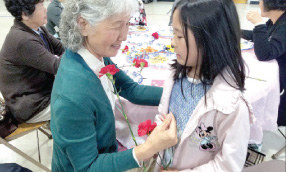
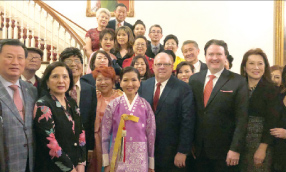

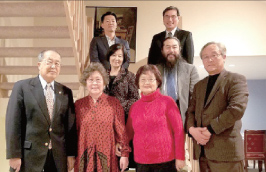
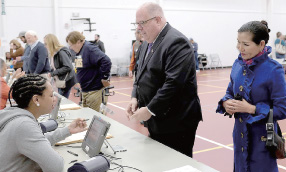








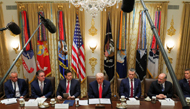






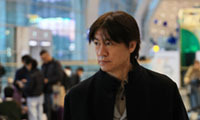















.png)


댓글 안에 당신의 성숙함도 담아 주세요.
'오늘의 한마디'는 기사에 대하여 자신의 생각을 말하고 남의 생각을 들으며 서로 다양한 의견을 나누는 공간입니다. 그러나 간혹 불건전한 내용을 올리시는 분들이 계셔서 건전한 인터넷문화 정착을 위해 아래와 같은 운영원칙을 적용합니다.
자체 모니터링을 통해 아래에 해당하는 내용이 포함된 댓글이 발견되면 예고없이 삭제 조치를 하겠습니다.
불건전한 댓글을 올리거나, 이름에 비속어 및 상대방의 불쾌감을 주는 단어를 사용, 유명인 또는 특정 일반인을 사칭하는 경우 이용에 대한 차단 제재를 받을 수 있습니다. 차단될 경우, 일주일간 댓글을 달수 없게 됩니다.
명예훼손, 개인정보 유출, 욕설 등 법률에 위반되는 댓글은 관계 법령에 의거 민형사상 처벌을 받을 수 있으니 이용에 주의를 부탁드립니다.
Close
x